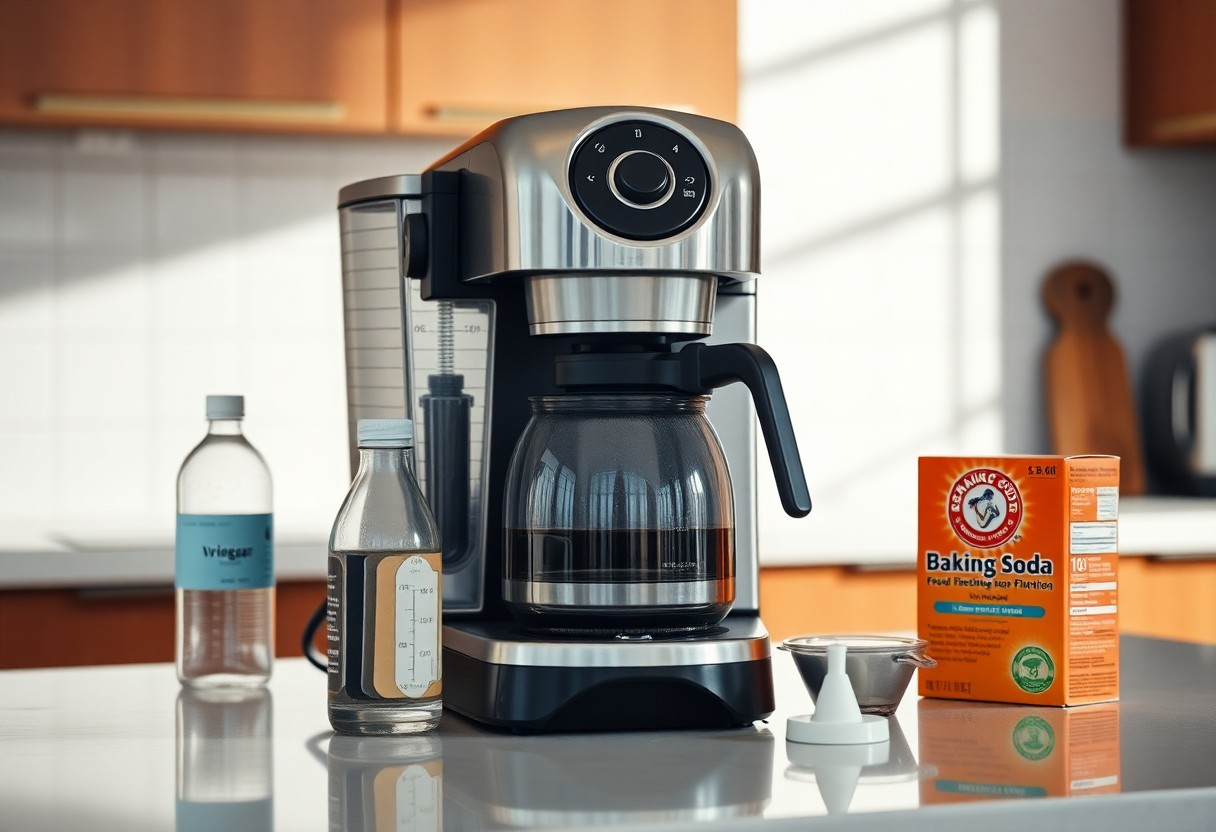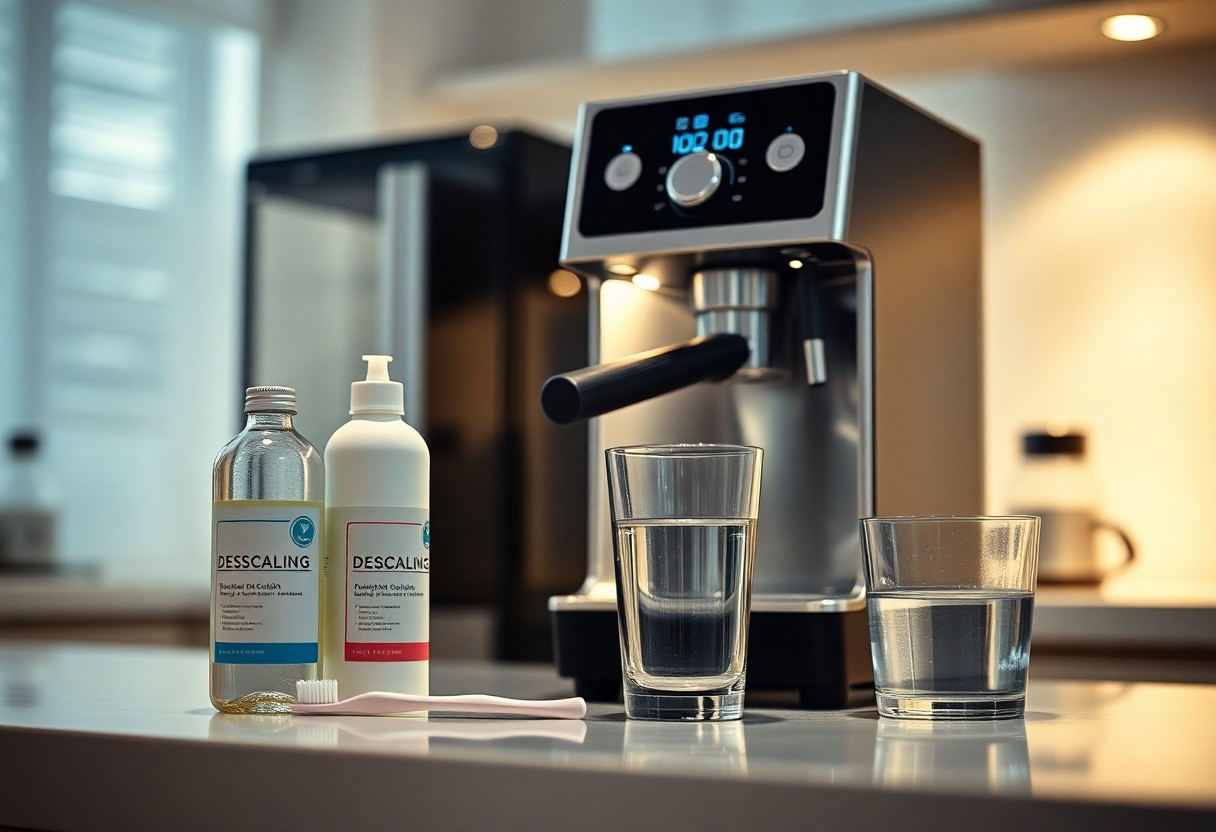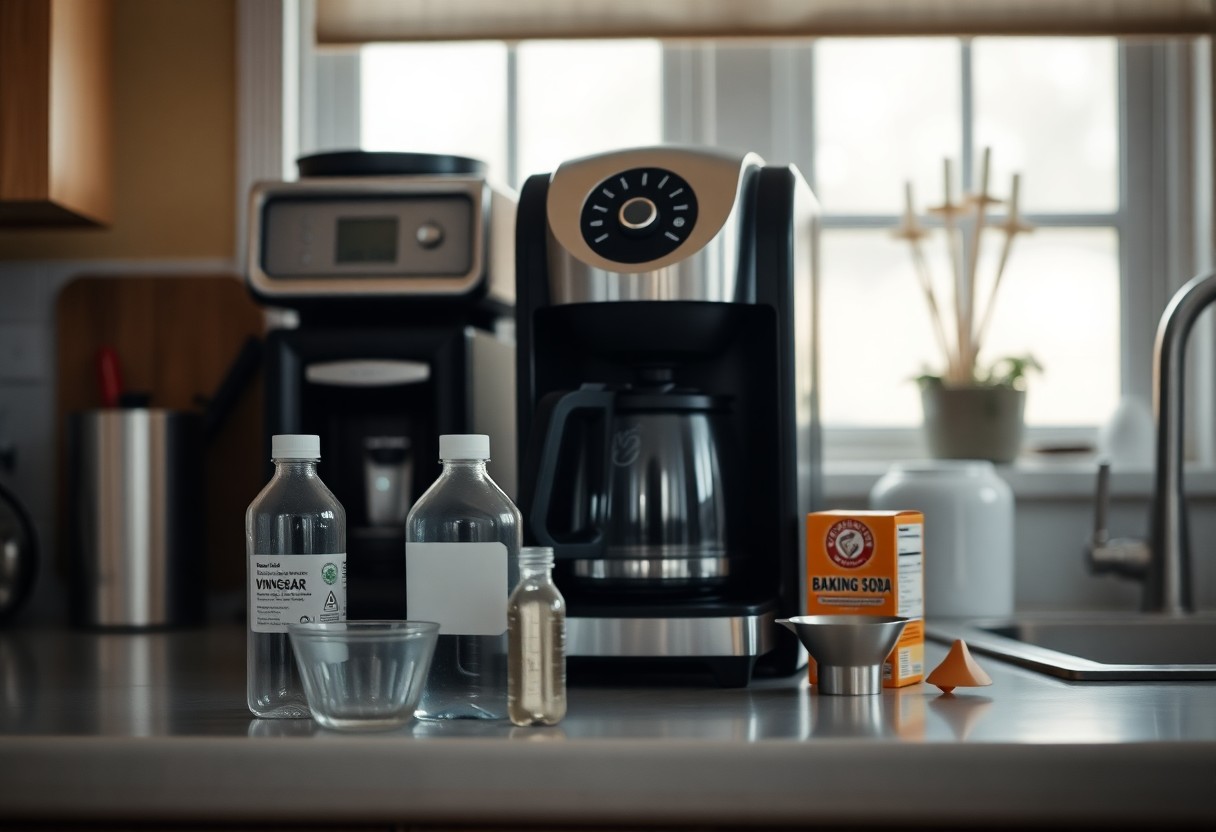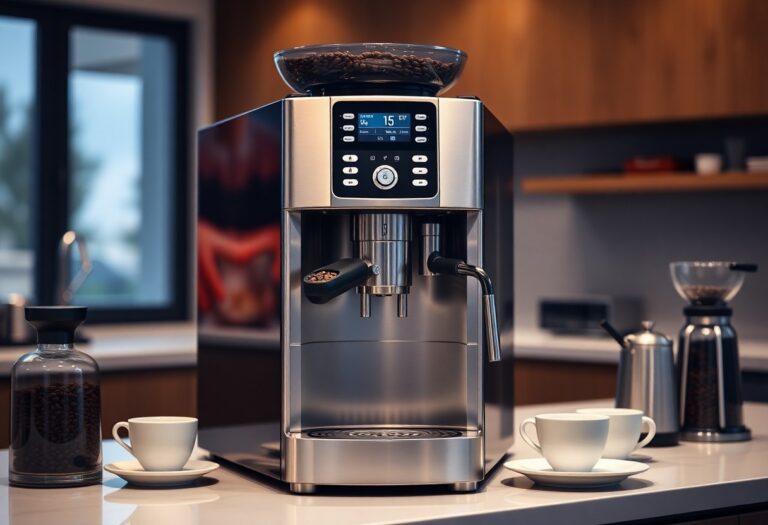What Can I Use to Clean My Coffee Machine – Cleaning Products
Products specifically designed for cleaning coffee machines can enhance your brewing experience and extend the life of your appliance. You might consider using vinegar, which acts as a natural descaler, or commercial descaling solutions that can effectively remove mineral buildup. Avoid using harsh chemicals that can potentially lead to harm or damage your machine. Regular maintenance with these recommended cleaning products will keep your coffee tasting fresh and your coffee maker in prime condition, ensuring you enjoy every cup.
Key Takeaways:
- Use white vinegar as a natural descaling agent to remove mineral deposits from your coffee machine.
- Baking soda can be effective for cleaning coffee pots and carafes, helping to eliminate stains and odors.
- Commercial coffee machine cleaners are specifically formulated for safe and effective cleaning, often addressing coffee oils and build-up.
- Cleaning tablets are convenient for single-serve machines, providing an easy solution for maintenance.
- Always follow the manufacturer’s guidelines for cleaning products to avoid damaging your coffee machine.

Harnessing the Power of Vinegar and Baking Soda
Utilizing vinegar and baking soda can effectively eliminate coffee stains and mineral buildup in your coffee machine. These natural substances are environmentally friendly alternatives to harsh chemicals. Vinegar acts as a strong acid that dissolves mineral deposits, while baking soda’s alkaline nature helps neutralize odors left behind. This combination not only cleans but also leaves your machine smelling fresh, making it an excellent choice for your regular maintenance routine.
The Science Behind Natural Cleaners
The effectiveness of vinegar and baking soda lies in their chemical properties. Vinegar contains acetic acid, which reacts with base components found in many mineral deposits. Baking soda, when combined with vinegar, creates effervescence, aiding in the loosening of grime and buildup within your coffee machine. This natural reaction not only cleans but also sanitizes, giving you a dual advantage in maintaining your coffee maker.
Step-by-Step Guide to Effective Use
For optimal results when cleaning your coffee machine with vinegar and baking soda, follow a precise method. Start by mixing equal parts of vinegar and water in your coffee machine’s reservoir. Brew this solution to flush out any stubborn residue, followed by a rinse cycle with fresh water. After this, sprinkle baking soda in the filter basket and run another brew cycle with clean water, effectively scrubbing away any remaining particles.
Step-by-Step Cleaning Process
| Step | Action |
|---|---|
| 1 | Fill the coffee machine reservoir with equal parts vinegar and water. |
| 2 | Run a brew cycle to cleanse the internal components. |
| 3 | Rinse the reservoir with fresh water by running another brew cycle. |
| 4 | Add baking soda to the filter basket. |
| 5 | Run a final cycle with clean water to flush out any remaining residue. |
This systematic approach ensures a thorough cleaning of your coffee machine. Adjust the ratio of vinegar and water depending on the level of buildup, using a more concentrated solution for heavier deposits. Baking soda will continue to freshen up your machine, while the combination enables you to enjoy your coffee without any residual impurities, leading to a better-tasting brew.

Exploring Descaler Solutions: When and Why They Matter
Descalers play an crucial role in maintaining your coffee machine’s performance and longevity. Built-up minerals from hard water can obstruct heating elements and affect the taste of your brew. Using a descaler every few months helps prevent these issues, ensuring a smooth, flavorful cup of coffee. By choosing the right descaler, you protect your investment and improve your coffee-making experience.
Understanding Mineral Buildup and Its Effects
Mineral buildup, primarily calcium and magnesium, occurs when hard water passes through your coffee machine. Over time, this buildup can lead to blockages and inefficiencies in brewing, resulting in inconsistent water temperature and poor extraction. Not only can it negatively impact the flavor of your coffee, but it can also shorten the lifespan of your machine. Regular descaling prevents these risks.
Top Commercial Descalers Reviewed
In the matter of commercial descalers, several products have made a name for themselves due to effectiveness and user satisfaction. Brands like Dezcal, Citric Acid, and Urnex are widely recommended among coffee enthusiasts and professionals alike. These products are specifically formulated to tackle tough mineral deposits and are typically safe for all types of coffee machines, including espresso makers and drip coffee makers.
Descalers like Dezcal boast powerful formulas that can eliminate even the most stubborn buildup within 30 minutes. Citric Acid is not only effective but also eco-friendly, offering a natural alternative that cleans without harmful chemicals. Urnex features a range of descalers tailored for different machines, ensuring you find the perfect match for your coffee maker. Regular use of these products will keep your machine running efficiently while preserving the rich flavors of your coffee.
Specialty Cleaners: Beyond the Basics
When standard cleaning solutions don’t meet your needs, specialty cleaners can significantly enhance your machine’s performance. These powerful cleaning agents are designed for deep cleaning and often tackle specific issues like grease buildup or stubborn coffee stains, ensuring your coffee machine runs smoothly. For a comprehensive approach, check out the Espresso Machine Cleaning Guide to discover advanced techniques catered to espresso machines that require more than just the basics.
The Benefits of Using Non-Toxic Ingredients
Opting for non-toxic ingredients not only promotes a safer kitchen environment, but it also protects your coffee machine from potentially harmful chemical residues. Natural solutions are gentle yet effective in removing coffee oils and residue without exposing you or your loved ones to harsh substances. Choosing such ingredients ensures a cleaner cup of coffee with no unwanted aftertastes—a win-win for both you and your health.
Recommended Brands and Products
Several brands specialize in coffee machine cleaners that are both effective and user-friendly. Look for products from reputable companies like Urnex and Cafiza. These brands offer well-formulated cleaners specifically designed for various coffee machines, ensuring that you can maintain your equipment without compromising on flavor. Many users have found that using these products enhances not only the taste but also the lifespan of their machines.
Urnex, for instance, provides an extensive range of cleaning products tailored for both regular brewing systems and espresso machines. Their line includes descalers and cleaners that are easy to use and highly effective, making them a popular choice among coffee enthusiasts. Cafiza is another name that stands out, particularly for its environmentally-friendly approach without sacrificing cleaning power. Investing in high-quality specialty cleaners from these brands can elevate your coffee brewing experience while ensuring your machine remains in top condition for years to come.
DIY Cleaning Solutions: Crafting Your Own Cleaners
Creating your own cleaning solutions can be an excellent way to maintain your coffee machine while saving money. Common household items like vinegar, baking soda, and lemon juice can be repurposed into effective cleaners. These DIY alternatives not only tackle stubborn stains and mineral deposits, but they also reduce your exposure to synthetic chemicals, promoting a healthier kitchen environment.
Recipes for Effective Homemade Alternatives
To craft a simple cleaner, mix equal parts of white vinegar and water in your coffee machine’s reservoir and run a brewing cycle. For a more robust solution, combine two tablespoons of baking soda with a cup of warm water, stir to dissolve, and then pour it into the machine. Allow it to sit for 15 minutes before rinsing thoroughly with clean water.
Pros and Cons of Going DIY
Pros and Cons of Going DIY
| Pros | Cons |
|---|---|
| Cost-effective solutions | May require more time and effort |
| Non-toxic ingredients | Less predictable results |
| Easily accessible items | Potential for ingredient incompatibility |
| Customizable formulations | Can still cause buildup if not used properly |
| Less environmental impact | Requires knowledge of correct proportions |
Choosing to go the DIY route for cleaning your coffee machine offers significant advantages, primarily in cost and environmental impact. However, it might require a bit of trial and error before you find the perfect homemade blend. Familiarizing yourself with common household reactions and the specific needs of your machine can enhance effectiveness and prevent any unwanted issues, such as mineral buildup or malfunction.
The Importance of Regular Maintenance: A Cleaning Schedule
A consistent cleaning schedule keeps your coffee machine performing at its best and enhances flavor quality. Regular maintenance not only prolongs the life of your appliance but also ensures that you are enjoying fresh, delicious coffee every time. Coffee Cleaning Products readily available can help simplify this process.
Establishing a Routine That Works
Developing a personalized cleaning routine tailored to your habits is vital. For instance, if you brew coffee daily, a weekly deep clean might be appropriate. Consider setting reminders to clean and descale your machine, ensuring it becomes a regular part of your coffee ritual without disrupting your daily grind.
Tools and Accessories to Simplify the Process
Utilizing the right tools can significantly ease the cleaning process. Items like specialty brushes, microfiber cloths, and descaling solutions are designed to tackle specific areas of your coffee machine, making maintenance less of a chore.
Investing in vital tools not only enhances your cleaning routine but also ensures thorough cleansing of hard-to-reach areas. For example, a coffee machine cleaning brush can help remove grounds from ports, while a microfiber cloth is perfect for wiping down surfaces without leaving residue. Additionally, descaling packets eliminate mineral buildup with minimal effort, allowing you to maintain your machine’s efficiency effortlessly. Having the right accessories on hand can make regular maintenance feel less daunting and keep your coffee experience at its finest.
Summing up
As a reminder, keeping your coffee machine clean is vital for maintaining the quality of your brews. You can use a variety of cleaning products such as white vinegar, descaling solutions specifically designed for coffee machines, or even baking soda mixed with water. Each option has its benefits, so consider your machine type and personal preferences when choosing a cleaning method. Regular maintenance not only prolongs the life of your machine but also enhances your overall coffee experience. Ensure you follow the manufacturer’s guidelines for the best results.
Q: What types of cleaning products can I use for my coffee machine?
A: There are several cleaning products you can use for your coffee machine, including descaling solutions, vinegar, baking soda, and specialized coffee machine cleaner tablets. Descaling solutions are formulated to remove mineral buildup, while vinegar and baking soda are natural cleaners that can also effectively clean and deodorize your machine. Coffee machine cleaner tablets are designed specifically for different types of coffee machines and can be very effective.
Q: How often should I clean my coffee machine?
A: It’s recommended to clean your coffee machine regularly to maintain its performance and the quality of your coffee. For regular cleaning, aim to rinse and wash removable parts after each use. For deeper cleaning, consider descaling your machine every three to six months depending on your water hardness and usage. Additionally, using coffee machine cleaner tablets every month can help keep your machine in top condition.
Q: Can I use regular dish soap to clean my coffee machine?
A: While it is possible to use regular dish soap to clean removable parts of your coffee machine, it is not advisable to use it internally. Dish soap can leave a residue that may affect the taste of your coffee. Instead, use a mixture of water and vinegar for internal parts, or opt for a cleaner specifically designed for coffee machines to avoid any unwanted taste or odor.
Q: Is vinegar safe to use for cleaning my coffee machine?
A: Yes, vinegar is safe to use as a cleaning agent for your coffee machine. It is effective at removing mineral buildup and odors. To use vinegar, mix equal parts of water and vinegar and run it through a brewing cycle, followed by several cycles of plain water to ensure no vinegar taste remains. However, if your manufacturer advises against using vinegar, it’s best to follow those recommendations.
Q: What should I do if my coffee machine has a stubborn stain or buildup?
A: For stubborn stains or buildup in your coffee machine, a combination of baking soda and water can be used as a gentle abrasive cleaner. Create a paste and apply it to the affected areas, then scrub gently. Additionally, using a commercial coffee machine cleaner designed for your specific model may be effective in tackling tough stains. Always follow the manufacturer’s guidelines when using any cleaning products.







